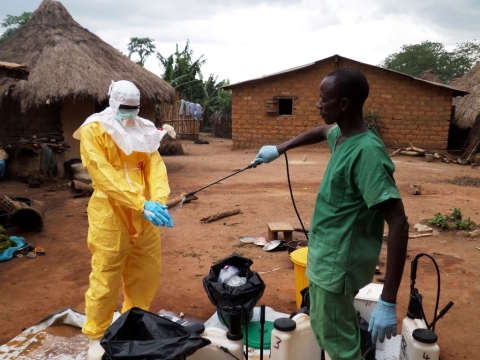
When the Ebola virus began to engulf parts of Africa in late March 2014, rumors and misinformation quickly started to spread.
Nigeria's Minister of Health, Professor Onyebuchi Chukwu, announced the government would test the use of a drug called Nano Silver to cure Ebola patients. Health experts denounced the drug, and Chukwu later said the drug “did not meet the requirements of the national health research ethic code.” But despite withdrawing his decision to test Nano Silver, the idea that there was a possible cure for Ebola had already entered the minds of many Nigerians.
Nigerians weren't fixated on just one possible Ebola cure: Other rumored cures included bathing in warm, salty water and drinking a liquid made with water and parts of the ewedu plant.
“In that initial period of uncertainty, there was a degree of shock of people not quite knowing what to do,” Africa Check Editor Julian Rademeyer told IJNet. “When the first patient was diagnosed in Nigeria, there was a lot of confusion. The government in particular was looking for some form of formal treatment.”
In an effort to counteract the damage of falsehoods being dispersed into the rumor mill during the Ebola crisis, Africa Check, a nonprofit that promotes accuracy in the media and public discourse, researched and published several reports revealing the truth: There was no known cure.
Africa Check published several reports debunking myths about Ebola on its website and distributed content to its syndication list, which includes media houses throughout southern Africa and Nigeria. Some publications, such as the Premium Times in Nigeria, republished the reports with permission.
“If you look back, there were a shocking number of reports put out by media in Africa and outside it that showed staggering degrees of ignorance,” Africa Check Executive Director Peter Cunliffe-Jones said. “From the causes and patterns of the disease to, and this one much more in the case of media outside Africa obviously, the basic geography of a continent. If there was one flaw, above all, it was people reporting a story they clearly did not understand.”
Health coverage is a key focus for Africa Check, Rademeyer said, considering South Africa's history of fake cures for major health issues, such as HIV/AIDS.
“There’s a long and kind of tragic history on the continent of quack cures being given — to some degree — a credence,” Rademeyer said, later adding that the “potential of devastation” of people taking these cures seriously “is far reaching.”
While fact-checking supposed remedies and other health concerns is a priority, Africa Check looks into all sorts of claims throughout South Africa, where it has a fully staffed team, and Nigeria. Using trusted freelancers, the organization has also reported on countries such as Zambia, Zimbabwe, Swaziland and Namibia. (Eventually, the organization plans to expand to Kenya and Senegal, where it will have a French-language site.)
The site also focuses on fact-checking elections throughout the countries it covers. Its recent coverage of the Nigerian elections set the record straight for voters. Africa Check verified and pointed out false or exaggerated statements made by both parties seeking power, the sitting People’s Democratic Party (PDP) and the All Progressives Congress (APC), which won the election in April.
But working with party officials and the government in Nigeria wasn't easy, Rademeyer explained. Typically when Africa Check is investigating a claim or news report, they ask the person who made the statement if they have any evidence to substantiate that claim. From there, the fact-checkers look for other available information and data.
During the Nigerian elections, there was essentially “dead silence from political parties and the government,” Rademeyer said, noting that officials would only contact them after a report was published.
However, this isn't the first time Africa Check has received pushback or been forced to work with less information than they would prefer. The first year its staff covered the South African elections, both political parties were resistant to cooperate and largely ignored them. Now, for the most part, officials respond swiftly and provide links or documents substantiating their claims.
Since there's not a huge culture around political fact-checking where Africa Check reports, only time will help procure cooperative officials in the countries it covers.
“The idea of fact-checking has been around in the U.S. for almost a decade now,” Rademeyer said. “In many African countries, it’s not something that many people expect or that political parties appreciate.”
Need tips on fact-checking? Read over Africa Check's tip sheets and guides:
- How to fact check
- How reporters can ensure accuracy in their writing
- How to get started with data journalism
- Understanding and reporting on opinion polls
Africa Check is a winner of the African News Innovation Challenge, a project of ICFJ Knight Fellow Justin Arenstein.
This post is also published on IJNet, which is produced by ICFJ.
Main image CC-licensed by Flickr via European Commission.